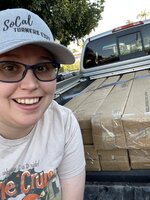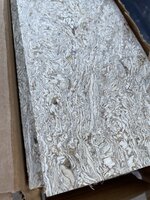You are using an out of date browser. It may not display this or other websites correctly.
You should upgrade or use an alternative browser.
You should upgrade or use an alternative browser.
Got a big order of HempWood in today!
- Thread starter KateHarrow
- Start date
Signed-In Members Don't See This Ad
Signed-In Members Don't See This Ad
TellicoTurning
Member
What is Hempwood??
KateHarrow
Member
It's an engineered wood product made from hemp fiber. They can go from planting seeds to having lumber in 4-5 months so it's super sustainable. It also take color like an absolute champ so I love working with it. Here's some of my workWhat is Hempwood??
Attachments
-
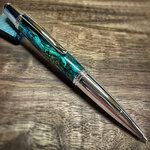 CA055E77-DCA3-47CE-80CD-E5C1473322DB.jpeg501.4 KB · Views: 144
CA055E77-DCA3-47CE-80CD-E5C1473322DB.jpeg501.4 KB · Views: 144 -
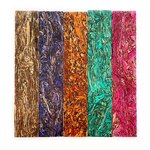 AA90C4C9-CF4D-499B-8CF8-B8898E1C330A.jpeg773.5 KB · Views: 148
AA90C4C9-CF4D-499B-8CF8-B8898E1C330A.jpeg773.5 KB · Views: 148 -
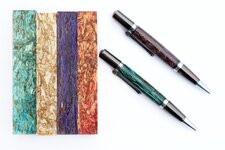 FED22B2D-88B3-4554-941E-389673208503.jpeg259.1 KB · Views: 141
FED22B2D-88B3-4554-941E-389673208503.jpeg259.1 KB · Views: 141 -
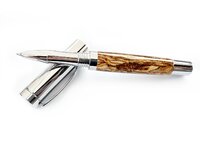 CF2DB7A9-350B-47D1-913E-B4FDBB7FF645.jpeg110.4 KB · Views: 137
CF2DB7A9-350B-47D1-913E-B4FDBB7FF645.jpeg110.4 KB · Views: 137 -
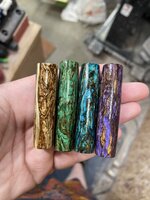 9F7FC20D-C709-46B1-9256-E39D128A95BB.jpeg340.2 KB · Views: 141
9F7FC20D-C709-46B1-9256-E39D128A95BB.jpeg340.2 KB · Views: 141 -
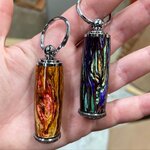 93DA76D3-7B86-4988-88EC-383D5754FA4F.jpeg349.1 KB · Views: 141
93DA76D3-7B86-4988-88EC-383D5754FA4F.jpeg349.1 KB · Views: 141 -
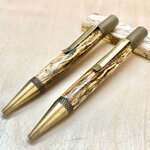 B57FF533-BF7A-46FF-8847-38AF26F346B0.jpeg433.4 KB · Views: 136
B57FF533-BF7A-46FF-8847-38AF26F346B0.jpeg433.4 KB · Views: 136 -
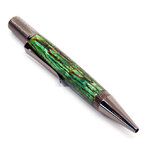 6201AE16-6447-4BB0-BE86-2544508DF8D7.jpeg52.5 KB · Views: 136
6201AE16-6447-4BB0-BE86-2544508DF8D7.jpeg52.5 KB · Views: 136 -
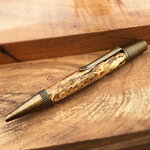 F7013931-C924-4251-9F60-CF42DA2EF705.jpeg305.8 KB · Views: 132
F7013931-C924-4251-9F60-CF42DA2EF705.jpeg305.8 KB · Views: 132 -
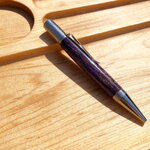 67BEA35F-36D3-4FD5-AC5D-4A38BDB0F6E5.jpeg684.4 KB · Views: 129
67BEA35F-36D3-4FD5-AC5D-4A38BDB0F6E5.jpeg684.4 KB · Views: 129 -
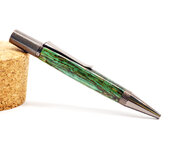 715D65C4-EE00-4C20-9C59-9159C91C3865.jpeg198 KB · Views: 122
715D65C4-EE00-4C20-9C59-9159C91C3865.jpeg198 KB · Views: 122 -
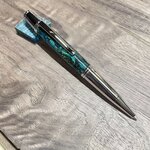 2E71852A-1431-4FEE-B041-460022403EEC.jpeg753.9 KB · Views: 172
2E71852A-1431-4FEE-B041-460022403EEC.jpeg753.9 KB · Views: 172
Will it hold up to turning without being stabilized?
David350
Member
Awesome pens and blanks. I can see why you like working with it...
Joebobber
Member
I think its like those apple blanks psi used to sell. Its just held together by pressure they put on it when pressing it into logs.
monophoto
Member
Sounds like OSB
montmill
Member
Very nice items. The product works well for you. Looks like you've got a lot of work ahead.
KateHarrow
Member
If you're very careful and patientWill it hold up to turning without being stabilized?
KateHarrow
Member
Thanks! I've worked really hard over the last two years to instill that love in others as well. Some of the stuff people have made with my stabilized material has just blown me awayAwesome pens and blanks. I can see why you like working with it...
KateHarrow
Member
Been cutting all day and I'm pooped. Looks like I haven't even made a dent either lolVery nice items. The product works well for you. Looks like you've got a lot of work ahead.
KateHarrow
Member
Like osb but a lot nicerSounds like OSB
KateHarrow
Member
I've heard of that! This at least has an adhesive involved. Then when stabilized it adds an extra level of solidityI think its like those apple blanks psi used to sell. Its just held together by pressure they put on it when pressing it into logs.
penicillin
Member
- Joined
- Feb 27, 2019
- Messages
- 1,036
I am still trying to understand the Hempwood company's "eco friendly" claims.
My issue is that I have yet to understand the difference between hempwood and the many people here who cast their own pen blanks with seeds or palm or apricot pits or whatever, and also the equivalent commercial plastic pen blanks I buy at local woodworking stores. To me, hempwood feels like the same thing, except they are casting their hempwood products (including pen blanks) with compressed hemp fibers and soy protein instead of the usual bird seed, palms, pits, etc. They claim the soy protein is the "binder", but they also list "cured resin" (is that plastic?) in their SDS.
To me, the typical non-wood pen blanks that people make, buy, and use here are essentially different types of plastic. Turning them into pens puts fine bits of plastic into the environment. I am not trying to play environmentalist here, but I wonder how much scrutiny the Hempwood company's eco friendly claims can withstand if you include the soy and resin materials (plastics?) that they use, rather than strictly focusing on the environmental advantages of hemp fibers over wood.
I want to be clear that I am not trying to discourage anyone from turning plastic pens for environmental reasons. My hunch is that penturning does not have a measurable impact on the overall plastic waste that humans generate. Still, we should at least consider the environmental impact we have when turning plastic, that's all. (When I got started turning plastic blanks, the dust would go into our outdoor environment, which I am ashamed to admit. When I saw the plastic dust coming off my turnings, I modified my process to capture it it better.)
I like the look of hempwood and do not discourage anyone from using it or making pens from it. The Hempwood company may be correct that their products are much better for the environment, but I have yet to understand their claims fully. That's mostly because they talk about hemp plants, but do not say much about the "plastic" components of their products.
Scroll down this home page to see some of their environmental claims:
https://hempwood.com
Here is their SDS:
https://secureservercdn.net/45.40.1...tent/uploads/2021/12/HempWood®-Lumber-SDS.pdf
Late edit:
Fixed link to SDS to be clickable.
My issue is that I have yet to understand the difference between hempwood and the many people here who cast their own pen blanks with seeds or palm or apricot pits or whatever, and also the equivalent commercial plastic pen blanks I buy at local woodworking stores. To me, hempwood feels like the same thing, except they are casting their hempwood products (including pen blanks) with compressed hemp fibers and soy protein instead of the usual bird seed, palms, pits, etc. They claim the soy protein is the "binder", but they also list "cured resin" (is that plastic?) in their SDS.
To me, the typical non-wood pen blanks that people make, buy, and use here are essentially different types of plastic. Turning them into pens puts fine bits of plastic into the environment. I am not trying to play environmentalist here, but I wonder how much scrutiny the Hempwood company's eco friendly claims can withstand if you include the soy and resin materials (plastics?) that they use, rather than strictly focusing on the environmental advantages of hemp fibers over wood.
I want to be clear that I am not trying to discourage anyone from turning plastic pens for environmental reasons. My hunch is that penturning does not have a measurable impact on the overall plastic waste that humans generate. Still, we should at least consider the environmental impact we have when turning plastic, that's all. (When I got started turning plastic blanks, the dust would go into our outdoor environment, which I am ashamed to admit. When I saw the plastic dust coming off my turnings, I modified my process to capture it it better.)
I like the look of hempwood and do not discourage anyone from using it or making pens from it. The Hempwood company may be correct that their products are much better for the environment, but I have yet to understand their claims fully. That's mostly because they talk about hemp plants, but do not say much about the "plastic" components of their products.
Scroll down this home page to see some of their environmental claims:
https://hempwood.com
Here is their SDS:
https://secureservercdn.net/45.40.1...tent/uploads/2021/12/HempWood®-Lumber-SDS.pdf
Late edit:
Fixed link to SDS to be clickable.
Last edited:
Joebobber
Member
I think the environmentally friendly part is that unlike tree wood, hemp is a fast growing, easily renewable replacement. Kind of like bamboo.I am still trying to understand the Hempwood company's "eco friendly" claims.
My issue is that I have yet to understand the difference between hempwood and the many people here who cast their own pen blanks with seeds or palm or apricot pits or whatever, and also the equivalent commercial plastic pen blanks I buy at local woodworking stores. To me, hempwood feels like the same thing, except they are casting their hempwood products (including pen blanks) with compressed hemp fibers and soy protein instead of the usual bird seed, palms, pits, etc. They claim the soy protein is the "binder", but they also list "cured resin" (is that plastic?) in their SDS.
To me, the typical non-wood pen blanks that people make, buy, and use here are essentially different types of plastic. Turning them into pens puts fine bits of plastic into the environment. I am not trying to play environmentalist here, but I wonder how much scrutiny the Hempwood company's eco friendly claims can withstand if you include the soy and resin materials (plastics?) that they use, rather than strictly focusing on the environmental advantages of hemp fibers over wood.
I want to be clear that I am not trying to discourage anyone from turning plastic pens for environmental reasons. My hunch is that penturning does not have a measurable impact on the overall plastic waste that humans generate. Still, we should at least consider the environmental impact we have when turning plastic, that's all. (When I got started turning plastic blanks, the dust would go into our outdoor environment, which I am ashamed to admit. When I saw the plastic dust coming off my turnings, I modified my process to capture it it better.)
I like the look of hempwood and do not discourage anyone from using it or making pens from it. The Hempwood company may be correct that their products are much better for the environment, but I have yet to understand their claims fully. That's mostly because they talk about hemp plants, but do not say much about the "plastic" components of their products.
Scroll down this home page to see some of their environmental claims:
https://hempwood.com
Here is their SDS:
https://secureservercdn.net/45.40.146.28/5po.4a0.myftpupload.com/wp-content/uploads/2021/12/HempWood®-Lumber-SDS.pdf
penicillin
Member
- Joined
- Feb 27, 2019
- Messages
- 1,036
I understand their point. My point is:I think the environmentally friendly part is that unlike tree wood, hemp is a fast growing, easily renewable replacement. Kind of like bamboo.
-> If they mix plastic with their fast growing, easily renewable hemp, how much does that plastic negate the environmental good of the hemp?
Hypothetical example:
Let's say I make a hypothetical 100% organic baby food. In my advertising, I claim that my hypothetical baby food is better for baby health because it uses 100% organic ingredients.
-> If I include ordinary tea in my hypothetical baby food products, then claims of "better for baby" may not be as valid, even if the tea is organic. (I read that tea contains tannin, which can interfere with a baby's iron absorption and potentially lead to nervous system damage. You are not supposed to give tea to babies for that reason.) Sure, the hypothetical baby food is still organic, but it is not "better for baby health."
KateHarrow
Member
The % of the plastic you're referring to is extremely low (I won't put a number out there because I don't remember exactly) and the only reason it's there is because they are primarily a flooring company and it's the thing helping the flooring be water resistant enough to actually be flooring.I understand their point. My point is:
-> If they mix plastic with their fast growing, easily renewable hemp, how much does that plastic negate the environmental good of the hemp?
Hypothetical example:
Let's say I make a hypothetical 100% organic baby food. In my advertising, I claim that my hypothetical baby food is better for baby health because it uses 100% organic ingredients.
-> If I include ordinary tea in my hypothetical baby food products, then claims of "better for baby" may not be as valid, even if the tea is organic. (I read that tea contains tannin, which can interfere with a baby's iron absorption and potentially lead to nervous system damage. You are not supposed to give tea to babies for that reason.) Sure, the hypothetical baby food is still organic, but it is not "better for baby health."
So yea there's a bit of plastic in it but it's certainly not much and the whole point is to create an alternative to cutting down trees to make flooring. I just happen to love the stuff and have been using the lumber to offer stabilized products to the turning community
penicillin
Member
- Joined
- Feb 27, 2019
- Messages
- 1,036
Good points. Clearly most plastic pen blanks have a much greater percentage of plastic compared with hempwood. No doubt about that.The % of the plastic you're referring to is extremely low (I won't put a number out there because I don't remember exactly) and the only reason it's there is because they are primarily a flooring company and it's the thing helping the flooring be water resistant enough to actually be flooring.
So yea there's a bit of plastic in it but it's certainly not much and the whole point is to create an alternative to cutting down trees to make flooring. I just happen to love the stuff and have been using the lumber to offer stabilized products to the turning community
If you look at the SDS link I posted above, you will see that the "Cured Resin" in hempwood is less than 5%, and "Other" is less than 2%. I don't know if the Soy (binder) counts as plastic, but I assume it does not.
Here is the hempwood SDS link again, for your convenience:
https://secureservercdn.net/45.40.1...tent/uploads/2021/12/HempWood®-Lumber-SDS.pdf
KateHarrow
Member
I've read it through many times, and perhaps I should've waited until I wasn't just answering on my phone to replyGood points. Clearly most plastic pen blanks have a much greater percentage of plastic compared with hempwood. No doubt about that.
If you look at the SDS link I posted above, you will see that the "Cured Resin" in hempwood is less than 5%, and "Other" is less than 2%. I don't know if the Soy (binder) counts as plastic, but I assume it does not.
Here is the hempwood SDS link again, for your convenience:
https://secureservercdn.net/45.40.1...tent/uploads/2021/12/HempWood®-Lumber-SDS.pdf
The owner of the company and I are good friends at this point. The soy based adhesive is the same glue used in pure bond plywood which if I remember correctly is the most eco friendly on the market. One of the things I appreciate about HW as a company is that they are continuing to improve and continuing to pursue more eco friendly production methods. Deforestation is a huge issue and hemp textiles, lumber, and more can really help move us towards a better future IMO

